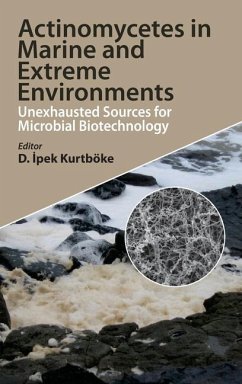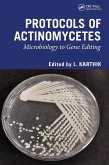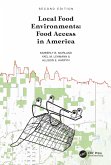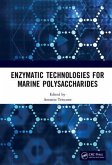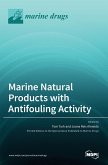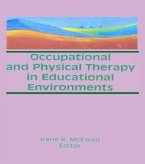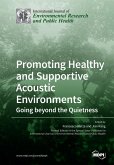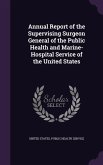Actinomycetes in Marine and Extreme Environments
Unexhausted Sources for Microbial Biotechnology
Herausgeber: Kurtboke, Ipek
Actinomycetes in Marine and Extreme Environments
Unexhausted Sources for Microbial Biotechnology
Herausgeber: Kurtboke, Ipek
- Gebundenes Buch
- Merkliste
- Auf die Merkliste
- Bewerten Bewerten
- Teilen
- Produkt teilen
- Produkterinnerung
- Produkterinnerung
This book brings together expert actinomycetologists to communicate the importance of finding novel antibiotic producing actinomycetes in extreme and marine environments in the light of molecular advances.
Andere Kunden interessierten sich auch für
![Protocols of Actinomycetes Protocols of Actinomycetes]() Protocols of Actinomycetes153,99 €
Protocols of Actinomycetes153,99 €![Local Food Environments Local Food Environments]() Kimberly B. MorlandLocal Food Environments266,99 €
Kimberly B. MorlandLocal Food Environments266,99 €![Enzymatic Technologies for Marine Polysaccharides Enzymatic Technologies for Marine Polysaccharides]() Enzymatic Technologies for Marine Polysaccharides337,99 €
Enzymatic Technologies for Marine Polysaccharides337,99 €![Marine Natural Products with Antifouling Activity Marine Natural Products with Antifouling Activity]() Marine Natural Products with Antifouling Activity62,99 €
Marine Natural Products with Antifouling Activity62,99 €![Occupational and Physical Therapy in Educational Environments Occupational and Physical Therapy in Educational Environments]() Irene McewenOccupational and Physical Therapy in Educational Environments154,99 €
Irene McewenOccupational and Physical Therapy in Educational Environments154,99 €![Promoting Healthy and Supportive Acoustic Environments Promoting Healthy and Supportive Acoustic Environments]() Promoting Healthy and Supportive Acoustic Environments103,99 €
Promoting Healthy and Supportive Acoustic Environments103,99 €![Annual Report of the Supervising Surgeon General of the Public Health and Marine-Hospital Service of the United States Annual Report of the Supervising Surgeon General of the Public Health and Marine-Hospital Service of the United States]() Annual Report of the Supervising Surgeon General of the Public Health and Marine-Hospital Service of the United States37,99 €
Annual Report of the Supervising Surgeon General of the Public Health and Marine-Hospital Service of the United States37,99 €-
-
-
This book brings together expert actinomycetologists to communicate the importance of finding novel antibiotic producing actinomycetes in extreme and marine environments in the light of molecular advances.
Hinweis: Dieser Artikel kann nur an eine deutsche Lieferadresse ausgeliefert werden.
Hinweis: Dieser Artikel kann nur an eine deutsche Lieferadresse ausgeliefert werden.
Produktdetails
- Produktdetails
- Verlag: CRC Press
- Seitenzahl: 334
- Erscheinungstermin: 6. Februar 2024
- Englisch
- Abmessung: 240mm x 161mm x 23mm
- Gewicht: 666g
- ISBN-13: 9780367252809
- ISBN-10: 0367252805
- Artikelnr.: 69484629
- Herstellerkennzeichnung
- Libri GmbH
- Europaallee 1
- 36244 Bad Hersfeld
- gpsr@libri.de
- Verlag: CRC Press
- Seitenzahl: 334
- Erscheinungstermin: 6. Februar 2024
- Englisch
- Abmessung: 240mm x 161mm x 23mm
- Gewicht: 666g
- ISBN-13: 9780367252809
- ISBN-10: 0367252805
- Artikelnr.: 69484629
- Herstellerkennzeichnung
- Libri GmbH
- Europaallee 1
- 36244 Bad Hersfeld
- gpsr@libri.de
Dr. Kurtböke's experiences in the field of biodiscovery with actinomycetes date back to 1982 when she was first involved in the large-scale production of antibiotic gentamicin in Eczac¿bä¿ ¿lä A.¿. in ¿stanbul, Türkiye. Subsequently she was at the University of Milan in Italy (1983-86) for graduate research followed by a Ph.D. at the University of Liverpool, UK (1990). Her most significant contribution has been the development of a novel isolation technique that selectively cultures rare actinomycetes with industrial importance which was adopted and applied by leading pharmaceutical companies since the 1990s. Since taking up her first post-doctoral position at the University of Western Australia (1990), she has established bio-resource libraries for joint screening ventures with leading pharmaceutical companies in different settings in Australia. She was one of the key scientists involved in the establishment of AMRAD Discovery Technologies Pty. Ltd.'s Australia's largest bioresource library in Melbourne (1995-2000). Since 2001 she has been at the University of the Sunshine Coast (UniSC) in Queensland, Australia, currently Associate Professor and teaching and conducting research in the fields of applied, industrial and environmental microbiology. Dr. Kurtböke's methodological strength in the field of actinomycetology played a key role in the detection of novel actinomycetes and contributed towards the establishment of yet another microbial library of bioactive actinomycetes at the UniSC. The library has been used for research and teaching activities at the UniSC as well as in collaborative partnership with regional, national, and international institutions for the discovery of new drugs, agro-biologicals, enzymes, and environmentally friendly biotechnological innovations. She has been an Executive Board Member of the World Federation of Culture Collections (WFCC) since 2000, currently serving her second term as the President of the Federation (2017-2020, 2021-2024). She is also one of the members of the International Committee on Taxonomy of Viruses (ICTV), Bacterial Viruses Subcommittee. She has editorial duties in different journals including Marine Drugs, Diversity and Frontiers Marine Science/Marine Biotechnology. She is also the editor of the books titled: Bacteriophages (2012, InTech), Microbial Resources-From Functional Existence in Nature to Industrial Applications (2017, Academic Press, Elsevier) and Importance of Microbiology Teaching and Microbial Resource Management for Sustainable Futures (2022, Academic Press, Elsevier) and all of which brought experts in the fields of microbial ecology, taxonomy, culture collections and industrial microbiology together to highlight the importance of diverse microbial resources for global sustainability and biotechnological innovations.
Sponge Symbiotic Actinomycetes as Sources of Novel Bioactive Compounds:
Atlantic and Pacific Ocean Examples. Actinomycetes from Tropical Marine
Environments of Thailand and their Biotechnological Applications. Nocardiae
Associated with Foaming Coastal Marine Waters of the Sunshine Coast in
Australia. Actinomycetes in Thermal Ecosystems. Entering Poorly Charted
Waters: The Biology of the Filamentous Acid-Loving Actinomycetes and
Acidimicrobia. A Retrospect on Actinomycete Diversity, Novelty and
Secondary Metabolites Isolated from Deserts of China. Multi-Metal Tolerant
Actinomycetes from Tin Tailings of an Ex-Mining Area. Extremotolerant
Rhodococcus as an Important Resource for Environmental Biotechnology.
Dereplication of the Termite Gut-associated Actinomycete Metabolome as a
Source of Bioactive Secondary Metabolites. Removal of Termite-associated
Antifungal Streptomycete Defence Barrier using Streptophages for Successful
Implementation of Biological Control Fungi. Diversity and Biotechnological
Potential of Actinomycetes in Arid Lands of Mongolia.
Atlantic and Pacific Ocean Examples. Actinomycetes from Tropical Marine
Environments of Thailand and their Biotechnological Applications. Nocardiae
Associated with Foaming Coastal Marine Waters of the Sunshine Coast in
Australia. Actinomycetes in Thermal Ecosystems. Entering Poorly Charted
Waters: The Biology of the Filamentous Acid-Loving Actinomycetes and
Acidimicrobia. A Retrospect on Actinomycete Diversity, Novelty and
Secondary Metabolites Isolated from Deserts of China. Multi-Metal Tolerant
Actinomycetes from Tin Tailings of an Ex-Mining Area. Extremotolerant
Rhodococcus as an Important Resource for Environmental Biotechnology.
Dereplication of the Termite Gut-associated Actinomycete Metabolome as a
Source of Bioactive Secondary Metabolites. Removal of Termite-associated
Antifungal Streptomycete Defence Barrier using Streptophages for Successful
Implementation of Biological Control Fungi. Diversity and Biotechnological
Potential of Actinomycetes in Arid Lands of Mongolia.
Sponge Symbiotic Actinomycetes as Sources of Novel Bioactive Compounds:
Atlantic and Pacific Ocean Examples. Actinomycetes from Tropical Marine
Environments of Thailand and their Biotechnological Applications. Nocardiae
Associated with Foaming Coastal Marine Waters of the Sunshine Coast in
Australia. Actinomycetes in Thermal Ecosystems. Entering Poorly Charted
Waters: The Biology of the Filamentous Acid-Loving Actinomycetes and
Acidimicrobia. A Retrospect on Actinomycete Diversity, Novelty and
Secondary Metabolites Isolated from Deserts of China. Multi-Metal Tolerant
Actinomycetes from Tin Tailings of an Ex-Mining Area. Extremotolerant
Rhodococcus as an Important Resource for Environmental Biotechnology.
Dereplication of the Termite Gut-associated Actinomycete Metabolome as a
Source of Bioactive Secondary Metabolites. Removal of Termite-associated
Antifungal Streptomycete Defence Barrier using Streptophages for Successful
Implementation of Biological Control Fungi. Diversity and Biotechnological
Potential of Actinomycetes in Arid Lands of Mongolia.
Atlantic and Pacific Ocean Examples. Actinomycetes from Tropical Marine
Environments of Thailand and their Biotechnological Applications. Nocardiae
Associated with Foaming Coastal Marine Waters of the Sunshine Coast in
Australia. Actinomycetes in Thermal Ecosystems. Entering Poorly Charted
Waters: The Biology of the Filamentous Acid-Loving Actinomycetes and
Acidimicrobia. A Retrospect on Actinomycete Diversity, Novelty and
Secondary Metabolites Isolated from Deserts of China. Multi-Metal Tolerant
Actinomycetes from Tin Tailings of an Ex-Mining Area. Extremotolerant
Rhodococcus as an Important Resource for Environmental Biotechnology.
Dereplication of the Termite Gut-associated Actinomycete Metabolome as a
Source of Bioactive Secondary Metabolites. Removal of Termite-associated
Antifungal Streptomycete Defence Barrier using Streptophages for Successful
Implementation of Biological Control Fungi. Diversity and Biotechnological
Potential of Actinomycetes in Arid Lands of Mongolia.

